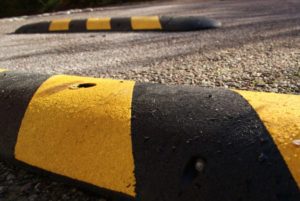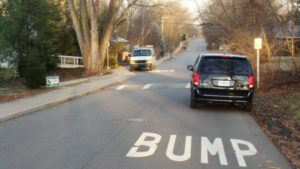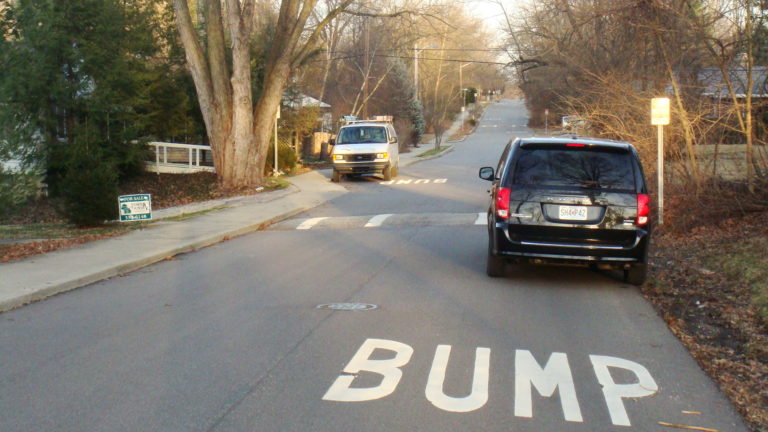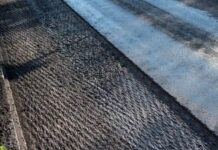Asphalt Speed Bumps: Some people drive at crazy speeds, blasting through neighborhoods, speeding past school zones, or racing to get to work. No matter the case, people driving at excessive speed have wreaked havoc on certain communities — sometimes resulting in third-party property damage and injuries.
As a result, many businesses are considering installing asphalt speed bumps as a traffic-calming measure on their property. If aggressive driver speeds through a parking lot with asphalt speed bumps, they risk damaging the frame and undercarriage of their vehicle. It is a harsh lesson for drivers, but it is also necessary.
If you are thinking about installing asphalt speed bumps on your commercial property, here are five things to consider:
5 Things to Consider Before Installing Asphalt Speed Bumps
1. Determine your goal
 Whatever your motive for installing asphalt speed bumps, some considerations must be made. Not only do you need a reason, but you also need a firm grasp on the placement of the speed bumps.
Whatever your motive for installing asphalt speed bumps, some considerations must be made. Not only do you need a reason, but you also need a firm grasp on the placement of the speed bumps.
Understanding why you need asphalt speed bumps, what you hope to accomplish with them, and where they should be placed is critical to ensure your overall vision is realized and the speed bumps serve their purpose.
Having a clear vision throughout the process — from planning to execution — can also help you minimize any complications that may arise during the asphalt speed bump installation.
2. Think about other materials Asphalt has long been the preferred material for most commercial property owners. However, the inventory of materials available has expanded significantly. Nowadays, speed bumps can be built using various materials, including concrete, rubber, and even some recycled plastic.
Asphalt has long been the preferred material for most commercial property owners. However, the inventory of materials available has expanded significantly. Nowadays, speed bumps can be built using various materials, including concrete, rubber, and even some recycled plastic.
More importantly — you will need to consider which materials are ideal for the surfaces on which the speed bumps will be installed. Weather, moisture, and traffic flow will all have a bearing on those materials, so be sure you have a solid plan in place for which material to use.
3. Consider the pattern to prevent excessive speedsAsphalt speed bump installation is not a one-size-fits-all practice. As a matter of fact, there are two different types of speed bumps — speed humps and speed bumps. The bumps slow traffic down by about 5 mph, whereas the humps slow traffic down by approximately 20 mph.
Around city streets and pedestrian crossings, speed humps are more common. Asphalt speed bumps are better for private roads or large open areas like parking lot. Choosing between the two is a matter of analysis and determining which speed ranges you wish to minimize within the driving zone you have.
4. Don’t forget traffic calming guidelines The distinction between speed bumps and humps — sometimes clubbed together as calming speed bumps — is not all. Additionally, you will need a plan for incorporating a traffic-calming technique into your asphalt speed bump installation so that drivers can gradually adjust to the new road surface additions when driving.
The distinction between speed bumps and humps — sometimes clubbed together as calming speed bumps — is not all. Additionally, you will need a plan for incorporating a traffic-calming technique into your asphalt speed bump installation so that drivers can gradually adjust to the new road surface additions when driving.
What exactly does this mean? This means that you should schedule your asphalt speed bump installation at the right time to avoid obstructing traffic or causing downtime for your business.
You must also ensure that all asphalt speed bumps are decal-marked per local regulations — this includes applying reflective tape or special paint on the bumps to make them visible to drivers day or night. Signage and other adjacent markers or warnings can also be helpful.
5. Hire a professional asphalt contractorDue to the high demand for asphalt speed bump installation these days, you can bet that there are multiple competing asphalt contractors in your area. So how do you find the right contractor for your project? A quick Google search will help you determine which contractors are available in your area and their client ratings. You can also ask other commercial property owners for their recommendations.
A competent asphalt contractor has qualified staff, can answer all your questions, make recommendations, and comes to the table with a realistic goal that can be achieved in a fair amount of time and at a reasonable cost. You may need to shop around, but the effort will be worthwhile in the long run.
Address
Commonwealth Paving, 136 Outerloop, Louisville, Kentucky 40214
Phone: 502-459-7283, Fax: 502-456-2678
Opening Hours
| Monday | 9:00 AM – 5:00 PM |
| Tuesday | 9:00 AM – 5:00 PM |
| Wednesday | 9:00 AM – 5:00 PM |
| Thursday | 9:00 AM – 5:00 PM |
| Friday | 9:00 AM – 5:00 PM |
| Saturday | Closed |
| Sunday | Closed |







